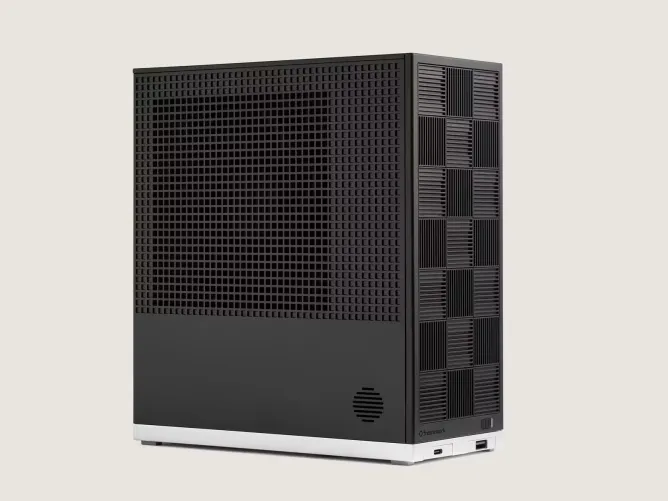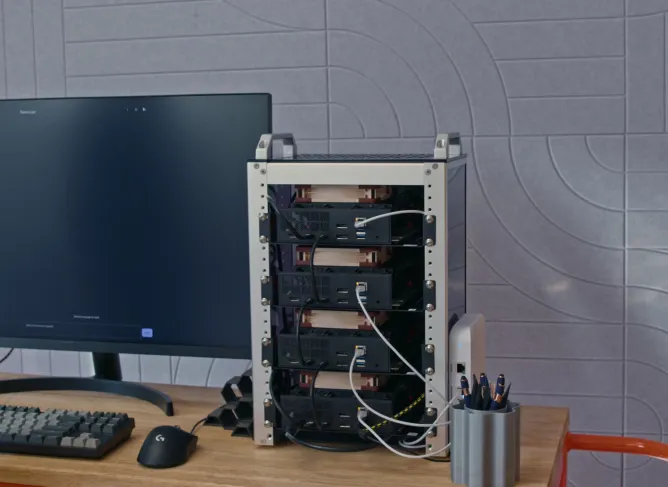Framework, the company renowned for revolutionizing modular and repairable laptops, is making waves once again — this time with its first-ever desktop computer. Don’t be fooled by its compact size; this small desktop PC delivers extraordinary performance, positioning itself as a formidable contender in both gaming and local AI inference.
A Peek Inside: The Power of AMD’s Strix Halo Architecture
The most captivating aspect of Framework’s desktop isn’t just its sleek design but what lies beneath the hood. Framework is among the first companies to integrate AMD’s brand-new Strix Halo architecture, powered by the Ryzen AI Max processors — a cutting-edge all-in-one processing unit built to handle even the most demanding tasks.
This strategic choice makes the Framework Desktop an ideal fit for two key audiences: gamers craving a portable yet powerful rig, and developers or researchers eager to run large language models locally without relying on cloud services.
Design: Small, Customizable, and Unapologetically Unique
On the outside, the Framework Desktop looks almost playful — its ultra-compact 4.5L chassis is smaller than a PlayStation 5 or Xbox Series X. But beneath the whimsical exterior lies a serious machine. Built around a mini-ITX mainboard, the computer is engineered for both functionality and flair.
One standout feature is the customizable front panel, adorned with 21 interchangeable plastic square tiles. Customers can choose from a variety of colors and patterns when purchasing from Framework’s website, giving each device a personal touch.
Modular I/O: Expansion Made Simple
True to Framework’s modular ethos, the desktop PC offers impressive flexibility with its signature expansion card system. In addition to the standard ports found on a mini-ITX mainboard, users will find two expansion slots at the front and two at the back of the device.
Framework provides a diverse range of modules to choose from, including USB-C and USB-A ports, a headphone jack, an SD card reader, and even storage expansion cards. This level of customization ensures the machine adapts to your evolving needs.

Performance: Built to Handle the Future
At the heart of the Framework Desktop lies AMD’s Strix Halo APU, soldered directly to the mainboard for optimal performance. Framework offers two configurations:
- AMD Ryzen AI Max 385: 8 CPU cores, 32 graphics cores, and 40MB of cache
- AMD Ryzen AI Max+ 395: 16 CPU cores, 40 graphics cores, and 80MB of cache
The system also features two M.2 2280 NVMe SSD slots, providing ample room for lightning-fast storage. Cooling is handled by a fan and heat sink, while a compact power supply ensures efficient energy management.
The RAM Dilemma: Soldered Memory for Blazing Bandwidth
Perhaps the most controversial design choice is the lack of user-upgradable RAM. Framework offers configurations ranging from 32GB to 128GB of LPDDR5x memory, which is soldered to the board. While this means users can’t upgrade the RAM down the line, there’s a compelling reason behind the decision.
“To enable the massive 256GB/s memory bandwidth that Ryzen AI Max delivers, the LPDDR5x is soldered,” explained Framework CEO Nirav Patel. “We spent months working with AMD to explore ways around this, but ultimately determined that it wasn’t technically feasible to land modular memory at high throughput with the 256-bit memory bus.”
While this may be a dealbreaker for some, the upside is undeniable. With up to 128GB of unified memory, the Framework Desktop is capable of running massive language models like LLaMA 3.3 70B without breaking a sweat. Open-weight models from Mistral, Nous, Hermes, and DeepSeek are also expected to run smoothly, enabling researchers and developers to experiment with local AI inference without relying on cloud resources.

Beyond the Box: Endless Possibilities
In true Framework fashion, the company isn’t stopping at just selling the desktop as a standalone unit. They’re also offering the mainboard separately, opening up a world of possibilities for hardware enthusiasts and DIY builders.
For instance, Framework has already showcased a mini-rack with four Framework Desktop mainboards running in parallel — a perfect setup for intensive AI training or distributed computing tasks. This modular approach means you’re not just buying a PC; you’re buying into an ecosystem of innovation and adaptability.
Pricing and Availability
The Framework Desktop starts at $1,099 for the base model, while the high-end configuration costs $1,999. As with other Framework products, the desktop supports both Windows and popular Linux distributions, including Ubuntu, Fedora, and Bazzite (a gaming-optimized Linux variant).
Pre-orders are open now, with shipments expected to begin in early Q3 2025. Given Framework’s track record and the buzz surrounding this release, demand is likely to be high — so if you’re eyeing this tiny powerhouse, it might be wise to reserve yours sooner rather than later.
Whether you’re a gamer seeking a compact beast or an AI enthusiast ready to break free from cloud dependencies, Framework’s debut desktop is shaping up to be one of the most exciting hardware releases of the year. The future of computing is modular, powerful, and, thanks to Framework, more accessible than ever.










